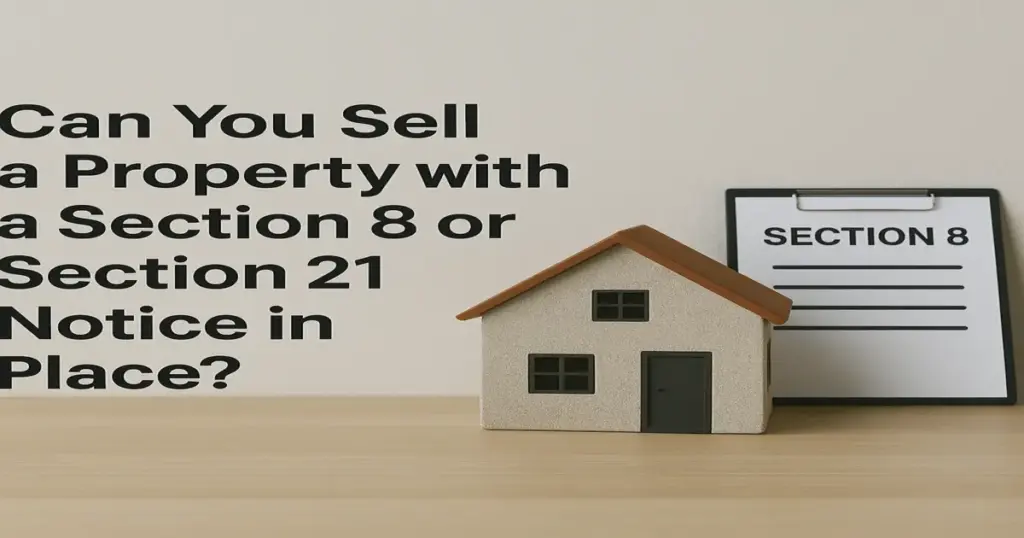Can You Sell a Property with a Section 8 or Section 21 Notice in Place?
Selling a rental property in England or Wales is rarely straightforward, especially when there’s an ongoing eviction involved.
Many landlords ask, “Can I sell my property with a Section 8 or Section 21 notice?” The short answer is yes, but the process has crucial legal, logistical, and financial implications.
This article explores the realities of selling a property with an already-issued eviction notice. Whether dealing with rent arrears, anti-social behaviour, or simply looking to exit the buy-to-let market, understanding your legal standing and strategic options is vital for a successful and stress-free sale.
Understanding Section 8 and Section 21 Notices
Before diving into the sales process, it’s essential to understand the key differences between Section 8 and Section 21 notices.
What Is a Section 8 Notice?
A Section 8 notice is served when a tenant has broken the terms of the tenancy agreement. This could be due to rent arrears, damage to the property, anti-social behaviour, or other breaches. The notice is governed by the Housing Act 1988 and includes specific grounds for possession, such as:
- Ground 8: Rent arrears of at least two months
- Ground 10 or 11: Persistent late payment of rent
- Ground 12: Breach of tenancy obligations
If the tenant does not leave voluntarily, the landlord must obtain a possession order in court. This process can be lengthy and requires solid evidence.
What Is a Section 21 Notice?
A Section 21 notice is a no-fault eviction notice, allowing landlords to regain possession of their property at the end of an assured shorthold tenancy (AST). No specific reason needs to be given, but the notice must meet strict legal requirements, such as:
- The tenancy must be an AST
- A valid gas safety certificate and EPC must have been provided
- The deposit must be protected in a government scheme
As the Renters Reform Bill develops, the future of Section 21 is uncertain, but it remains a legal tool.
Can You Sell a Property with a Section 8 or Section 21 in Place?
You can legally sell a property while an eviction notice is active under Section 8 or Section 21. However, the practical implications and how it affects the marketability of the property will vary depending on several factors:
- Buyer type (cash buyer, landlord, homeowner)
- Stage of eviction (notice served, court pending, possession granted)
- Tenant cooperation
- Condition of the property
- Potential rental income or liabilities
Let’s explore these in more detail.
Key Considerations When Selling with a Section 8 or 21 Notice
Buyer Type Matters
Traditional buyers—especially homeowners—tend to avoid properties with sitting tenants, let alone those involving eviction proceedings. However, cash buyers and property investors are often more flexible and may see an opportunity.
- Cash buyers are often experienced in dealing with tenants and legal complexities. Many specialise in distressed property sales.
- Buy-to-let landlords may see value in a property with a rent-paying tenant, even if an eviction is in motion.
- Owner-occupiers are typically uninterested unless the property will be sold with vacant possession and the eviction process is completed.
Disclosure and Transparency
If you’re selling with a Section 8 or 21 in place, you must disclose this to potential buyers and conveyancers. Failing to do so can lead to legal claims for misrepresentation.
Essential details to disclose include:
- Type of notice served
- Dates and grounds for eviction
- Current arrears or legal actions
- Copies of served notices and court paperwork
Impact on Valuation
Selling a tenanted property, particularly with an eviction in progress, can affect the sale price. Most investors or buyers will factor in the risks and potential delays, resulting in below-market offers.
While the discount varies, expect 10% to 25% reductions compared to vacant possession value. The risk premium may be even higher if the tenant actively resists eviction.
Timing the Sale
Your ability to complete a sale depends heavily on timing:
- If the notice period has expired and you have obtained a possession order, the property is more attractive to buyers.
- Some buyers may proceed if the court date is pending, but will likely offer less.
- If the eviction is newly served, buyers may hold off until there is clarity on possession.
Some landlords choose to wait until the eviction is complete. Others opt for a quick cash sale to avoid prolonged legal battles and rising costs.
Selling with Tenants Still in Situ
Even if your eviction notice is live, you can legally sell the property with the tenant still in place, provided the buyer agrees to take over the tenancy.
This can work well if:
- The buyer is a landlord seeking rental income.
- The buyer understands the eviction process and is willing to take over the proceedings.
- The tenancy produces income, or the buyer expects to renovate and resell later.
Ensure the tenancy agreement, rent ledger, deposit protection certificate, and notice paperwork are all properly documented and shared with the buyer’s solicitor.
Pros of Selling with a Section 8 or Section 21 Notice
- Faster exit: No need to wait for full possession if a buyer agrees to take over.
- Avoid legal costs: You may avoid court fees and bailiff costs if you sell before enforcement.
- Stress relief: Selling relieves you of managing the eviction and dealing with tenant disputes.
- Cash flow improvement: Fast property sales release capital tied up in underperforming assets.
Cons of Selling with a Section 8 or 21 Notice
- Reduced sale price: Buyers will demand a discount due to legal risk and uncertainty.
- Limited buyer pool: Many buyers won’t consider properties mid-eviction.
- Disclosure obligations: You must be fully transparent about the legal situation.
- No guarantee of sale: Even interested parties may back out during legal complications or due diligence.
Best Route: Sell to a Specialist Cash Buyer
If you want to sell fast without delays, your best option is a professional cash buyer specialising in problem properties. These companies:
- Purchase properties as-is, with or without tenants
- Are you comfortable with Section 8 and Section 21 situations
- Do not require mortgage approvals or long chains
- Often complete sales in as little as 7 to 21 days
This is ideal if:
- You’re under financial pressure
- The tenant is uncooperative or aggressive
- You need to release equity urgently
- You’re exiting the rental market permanently
Choose a buyer with solid reviews, no upfront fees, and a straightforward valuation process. Always instruct your solicitor for legal protection.
Legal and Practical Tips for Selling Mid-Eviction
Here’s how to prepare if you’re selling with an eviction notice active:
Organise Documentation
Ensure you have the following ready:
- Copy of the Section 8 or 21 notice
- Proof of service (signed delivery or witness)
- Court correspondence (if proceedings started)
- Tenancy agreement and rent history
- Deposit protection certificate
Instruct a Solicitor Early
Work with a conveyancer who is experienced in tenanted property sales. They’ll help you:
- Draft sale agreements that reflect ongoing eviction
- Liaise with buyer solicitors
- Manage possession timelines (if required for vacant sale)
Notify the Tenant (If Appropriate)
While not legally required, open communication with the tenant can sometimes ease the process. Letting them know your intentions may help avoid further conflict. Some sellers offer incentives for early departure, like covering moving costs.
Be Realistic About Offers
Due to the perceived risk, expect lower offers than the market value. However, this trade-off is often worthwhile if your priority is a quick, hassle-free sale.
Should You Wait Until the Eviction Is Complete?
There’s no one-size-fits-all answer. It depends on your goals:
- If maximising sale price is your top priority, it may be worth completing the eviction before listing the property.
- If speed and certainty are more important, selling with the notice in place, especially to a cash buyer, can be a better option.
Consider the cost of waiting:
- Mortgage repayments
- Legal fees for court action
- Time lost chasing rent
- Stress and uncertainty
Sometimes, cutting your losses and selling now is the more intelligent financial decision.
Final Thoughts: Know Your Exit Strategy
Selling a property mid-eviction can be done, but it’s not for the faint-hearted. Landlords must be legally prepared, commercially realistic, and tactically wise.
If you’re struggling with bad tenants or unpaid rent or are ready to leave the rental market, don’t wait until things spiral. Consider the benefits of a fast, cash sale to release yourself from the burden of problem tenants and ongoing legal battles.
FAQs: Selling with Section 8 or Section 21 Notice
Can I sell my house with a tenant in arrears?
Yes. However, expect reduced offers and limited buyer interest unless you sell to an experienced cash buyer.
Do I need to wait for the court to grant possession before selling?
Not necessarily. You can sell during the eviction process if the buyer is happy to proceed with the tenant in place.
Will the buyer need to start the eviction process again?
If the sale includes the tenant and a live eviction case, the new owner may be able to continue the process, depending on its progress.
Can I sell to a buyer who wants vacant possession while the eviction is active?
Yes, but the buyer may require that you complete the eviction before exchange or completion.
Will my solicitor handle the tenant issue during the sale?
They can advise and prepare contracts, but enforcing eviction remains your responsibility unless you sell with the tenant, who is still in situ.
For landlords looking to sell property with eviction notices in place, the key is understanding the legal process and finding the right buyer. Proper planning and the right sales strategy allow you to exit cleanly, even from a messy tenancy.
🔗 External Links
Gov.uk – Private Renting: Eviction Notices
Outlines when and how landlords can issue Section 8 or Section 21 notices.
https://www.gov.uk/evicting-tenantsGov.uk – How to Serve a Section 8 Notice
Official guidelines and downloadable Form 3 for serving a Section 8 notice.
https://www.gov.uk/guidance/assured-tenancy-forms#form-3Gov.uk – How to Serve a Section 21 Notice
Official requirements and Form 6A used for serving a Section 21 notice.
https://www.gov.uk/guidance/assured-tenancy-forms#form-6aShelter – Eviction Notices (England & Wales)
Independent legal advice for tenants and landlords on eviction processes.
https://england.shelter.org.uk/housing_advice/eviction
Let go of the stress, unlock your capital, and confidently move on.
Read our top Blogs:
Sell My Property Fast For Cash In Wandsworth
What to Do If Your House Won’t Sell: Fast Solutions That Work
How to Sell a House Fast: Proven Tips to Get a Quick Sale Without Estate Agents
📞 Call +447702210159 our friendly team for a same-day offer.





